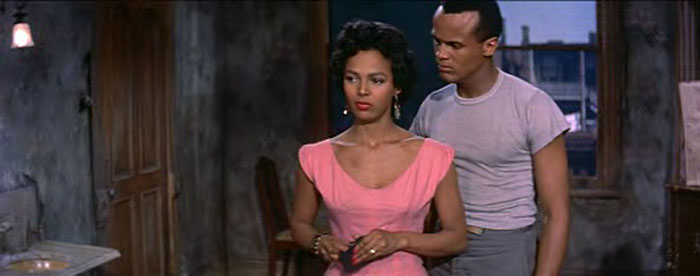
Directed by Otto Preminger
35 mm color film
105 minutes
Carlyle Productions
Carmen Jones was based on the 1943 Broadway musical by Oscar Hammerstein II, itself an adaptation of Georges Bizet’s 1875 opera Carmen. The plot recounts the relationship of an innocent young man, Joe (Harry Belafonte), and the sly young Carmen (Dorothy Dandridge), a character represented as equal parts whore and woman in love. She is no longer a Gypsy, as in the opera, but a classic femme fatale—a popular character in mainstream Hollywood dramas and musicals of the 1940s and 1950s. As is consistent with the conservatism of the day, it is inevitable that she comes to a tragic end.
Like Stormy Weather, the film is cast entirely with black actors, but the production is more elaborate here: filmed in Technicolor in wide-screen aspect, Carmen Jones is full of rich and elaborate visual detail. It sidesteps the subjects of racism and segregation central to the civil rights movement. Although much of the action is set in rural Louisiana, it is devoid of the white people who might have set into motion the fraught racial interaction of the Jim Crow South.
From the standpoint of race, Carmen Jones nevertheless represents a step up from earlier Hollywood black musicals, because its female lead—albeit a stigmatized and sexualized black woman—is paired with a strong and virile leading man, and a well-educated soldier at that. Joe is serious, handsome, and robust—a far cry from the comedians and tap dancers of earlier fare. And he is attentive to Carmen to a fault. Dandridge’s performance was groundbreaking: she was the first black woman to be nominated for the Academy Award for Best Actress, and the film won a Golden Globe Award for best comedy or musical.
Michele Wallace